« How to Customize SPB Mobile Shell | Main | mVisualVoiceMail v.6 -- Stop listening to voice mails »
January 15, 2008
Some Favorites from CES
As one of over 140,000 attendees at CES, I sometimes felt as if I were a lemming going along with the flow from one exhibit to another mostly in awe at the whole extravaganza. If there was any cohesive theme it had to be centered on the concept of digital integration. It was evident in the inter-connectivity of devices in lifestyle and environments for the workplace, home, and automobile.
Microsoft’s impressive exhibit illustrated the concept of interconnectivity the best with on-going presentations and exhibits illustrating the integration of their software and services. 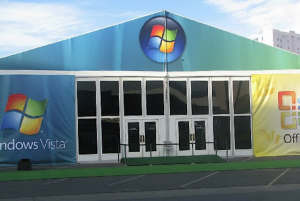
HP and other booths illustrated how digital technology can be used in every room of the house for convenience, comfort, productivity, security, and entertainment.
Many exhibitors addressed only some aspects of the integration possibilities. For instance there were many booths devoted to home security and the remote control of other home applications such as sprinklers, garage door, heating/cooling, hot tub/pool, lighting, video cameras and more. Some of the systems even integrated the use of a Windows Mobile device as a remote controller.
One entire hall was devoted to HD TV, video applications, furniture, sound, gaming, and mounting systems. With the advent of widescreen HDTV, a whole new style of furniture and interior design has emerged along with the home theater with special seating, sound systems, mounting, and connectivity considerations.
By the way, I think I’d put my money on Blu-Ray as the winner of the HD format war. Unless, by the time the dust settles, there is an entirely new format available.
There were games galore with special controllers and furniture. Judging from the cacophony coming out of some booths, the air guitars seemed to be the most popular, but that’s wandering astray from the handheld computing world--well, actually not. Hands-On Mobile of San Diego, CA, currently offers Guitar Hero Mobile.
The automobile is certainly a new focus and profit center for the integration of digital technology. Ford and Microsoft have teamed up to offer voice recognition, Bluetooth connectivity, and GPS. For several years Ford has offered Sirius satellite radio, but now it will combine MSN features such as emergency road service, live traffic and road conditions, gas prices, routing and rerouting.
The President of General Motors gave a keynote presentation indicating that GM has a few tricks up its sleeve as well. The rest of the automotive world will not be far behind.
What amuses me, however, is that all these “new” features have been part of my automobile environment for years, thanks to my trusty Windows Mobile devices with a few peripherals. But, I suppose the average person would prefer a more simple integration approach with everything already built-in.
Mobile Computing Devices
While I tried to take in everything, I’m sure I missed some nifty stuff because it was all just so overwhelming. However, I did try to focus on two things: new Windows Mobile devices and UMPCs.
I found several new WM6 devices, which I will review thoroughly as soon as I receive the evaluation units from Asus, Samsung, HP, Motorola, and Verizon. I was surprised at how few new devices were announced or released for the show. I’m not sure what HTC is doing and was never able to catch up with them, but they are getting more closed mouth now that they are working with carriers and marketing under their own name. Definite picks for best new releases include the Motorola Q9h, the Samsung shi760, and a new powerhouse iPaq Windows Mobile 6 classic release.
Since my article on UMPCs when they first emerged a couple of years ago, I have been watching to see if they would survive. While they have not and will not replace the Pocket PC, they have certainly established a respectable niche in the market. I was delighted to see several new models available.
I will be receiving units from Samsung and Asus for review and will share my findings soon. Suffice it to say for now that both companies have listened to user input and responded accordingly. You can look forward to many improvements and innovations in this evolving platform.
Apart from the big name brands such as Sony, Panasonic, and so forth, there were hundreds of booths in the Hilton and Sands venues with smaller manufacturer wannabees exhibiting some treasures, but you have to dig for them. Accordingly, I found a couple of manufacturers of great Windows Mobile devices and some really innovative UMPCs, which I hope to receive for review as well.
As for peripherals for our beloved pocket pals, I found a few gems that I will make part of my permanent pack.
Hands-Free Driving and Music
I’m always on the lookout for a good Bluetooth headset and headphones. I found both at the Jabra booth. My favorite is the Jabra BT8030 Bluetooth speaker and headphones. 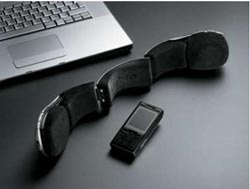 This is a first-time combination that is unique of the market. You can remove the headphones, fold them out, and they become speakers that broadcast your sound with Ziree Power Bass for a surprisingly full, rich sound environment. These are a must have in my mobile pack.
This is a first-time combination that is unique of the market. You can remove the headphones, fold them out, and they become speakers that broadcast your sound with Ziree Power Bass for a surprisingly full, rich sound environment. These are a must have in my mobile pack.
My only criticism of this otherwise brilliant product is that you cannot charge it via a USB connection. However, you can expect up to 32 hours listening time on a single charge and up to 600 hours standby time. They weigh just under 11 ounces. The suggested retail price is $250, but shop around and you can probably do better.
I’m always on the lookout for a comfortable BT headset that won’t fall out of my ear that is lightweight and not too ugly. 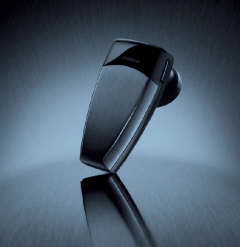 Jabra came to the rescue again with its new JX20 Pura, an elegantly crafted tiny titanium headset designed by Jacob Jensen the renowned Danish designer. It weighs less than a bird’s beak so that you don’t even know it’s there. You can listen to music with it too when you’re not talking on the phone.
Jabra came to the rescue again with its new JX20 Pura, an elegantly crafted tiny titanium headset designed by Jacob Jensen the renowned Danish designer. It weighs less than a bird’s beak so that you don’t even know it’s there. You can listen to music with it too when you’re not talking on the phone.
Its charging cradle is a work of art that will grace your desktop too. You can expect up to six hours talk time, and it can be charged in your car or via USB as well as AC. The sound quality is superb, and there is an automatic volume control.
This classy device will set you back as much as $179, which is a bit steep considering that you can buy a Bluetooth headset now for as little as $30, but you get what you pay for.
Mobile Video Just Got Better
One of my all-time favorite applications is getting better and better. I can’t imagine life without my Slingbox and SlingPlayer for my Windows Mobile devices which allows me to view my favorite live and recorded TV shows anywhere in the world with no monthly fees.
The reason I say it just got better is that with the newly released Pro-HD; you can watch full HD streaming and access multiple video sources. You can use it to stream HD video around your house to a desktop or laptop too. SlingCatcher will be coming soon, and it will make it possible to access your home video output from any video site on the Internet.
SlingPlayer 2.0 now comes with Clip+Sling, an application that allows you to record and send snips of videos, which is fun and extremely useful. Congratulations to SlingMedia for being one of the truly innovative companies in the digital universe.
Video Eyewear
I have a another pick for CES favorite—MyVu.com, which is a video viewing solution for portable devices. While this company seems hung up on iPods, it also offers a universal viewer that is supposed to work with all video output portable devices. 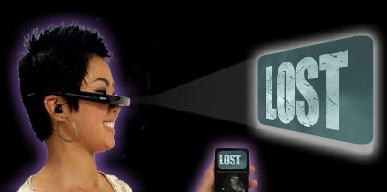 What you get for $199 is a pair of glasses that projects video output as if you were viewing it on a 27 inch screen. It’s a wonderful concept, but I’m not certain yet just what you can project. It was such pandemonium in the booth that I couldn’t get any satisfactory answers.
What you get for $199 is a pair of glasses that projects video output as if you were viewing it on a 27 inch screen. It’s a wonderful concept, but I’m not certain yet just what you can project. It was such pandemonium in the booth that I couldn’t get any satisfactory answers.
My viewing experience was that the image seemed small, isolated, non-involving, and low resolution. It could be that the game I was watching was not up to par as far as output is concerned, but what I saw left something to be desired.
Now, if you could view the output screen of your Windows Mobile device and anything that it displays in the same resolution that appears in the palm of your hand, this would be a worthwhile gadget indeed.
My.Vu offers the Crystal 701, which is an elegant hand-free viewing eyeware device with earbuds and VGA resolution and a USB rechargeable battery with up to 4 hours viewing time.
There is also the shades 301 model with sunshades and up to 10 hours viewing time. You can also get the Edge301, which is a more compact design for hands-free viewing with earbuds and a 4 hour rechargeable battery. Check it out at www. myvu.com.
As I progressed through the show, I noticed that there were other similar devices. In fact, there are many competitors in this market, but none as established as MyVu. Another competitor that seemed a good solution is Vuzix, a company that produces consumer video eyewear, medical devices, and tactical display-ware for the military.
The VR920 device simulates a 62” viewing screen but costs $399.95. The ultimate model costs $999.00. What a great way to enhance the mini screen on your handheld device. Clearly, this is a winning application that extends the limitations of Windows Mobile device small screens.
Mobile Scanning and Printing
I recently submitted an article to Smartphone and Pocket PC magazine on some of the tools I recommend for mobile productivity. I mentioned a portable scanner and printer that I try to avoid toting unless I know for certain I will need them. That was before CES and my discovery of an incredible pair of products from PlanOn with its DocuPen and petite printer.

I almost passed this booth as I had my eye on a fancy robot down the aisle when an attractive woman asked me if I had ever heard of a DocuPen. She was waving what might be a high-tech wand at me that Harry Potter would be proud to possess. It looked like a somewhat oversized ball point pen.
The demonstration blew me away, for all you have to do is wave it over any document or graphic, and it will record it in black and white, grayscale, or 24-bit full color.
It comes with PaperPort scanning software, weighs 1.75 ounces, runs on rechargeable lithium Ion batteries and features a micro-SD expansion card for additional storage. A Universal Mobile Charger accessory is good for up to 55 charges when a power source is not available.
Pair the DocuPen with the PS900 Printstik via Bluetooth, and you have a powerful mobile solution. Of course you can also transmit a scanned image to your Windows Mobile device if you wish to use it in a PowerPoint presentation or email it. Of course, you can print images already in your mobile device too.

The PrintStick is a mere 1” x 1.9” x 11” and weighs 1.9 pounds including the thermal paper and cartridge. It prints up to 3 pages per minute on 8.5” wide sheets. A cartridge will print 20 8.5 x 11 inches pages. Power options include AC 120-240, DC 12/24V, and rechargeable Lithium-ion battery.
The suggested retail price is $299 for each unit. Accessories are extra. In any case, this winning combination could be worth its weight in gold on the road in emergency situations. I’m glad that lady waived her wand at me and that I didn’t turn into a pumpkin. Check it out at www.planon.com.
MagicJack
I have one more amazing little device to share with you that impressed me even though it is not exactly in the handheld realm. It’s the MagicJack, a unique VoIP solution. 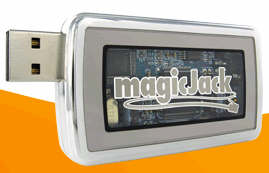 We’ve all heard of Vonage and Skype no doubt, but along comes MagicJack with a totally new approach to VoIP. Imagine a little box about the size of a pack of strike anywhere matches with a USB male plug extending from it.
We’ve all heard of Vonage and Skype no doubt, but along comes MagicJack with a totally new approach to VoIP. Imagine a little box about the size of a pack of strike anywhere matches with a USB male plug extending from it.
Just plug it into any PC USB jack, plug a regular analog phone into the other end, and start talking. Local and long distance calls are free. This phone system has all the bells and whistles you would expect from an expensive landline account such as voice mail, call waiting, and caller ID. It even has call forwarding so that you can forward calls to your mobile phone, which justifies its inclusion in this article, I suppose.
The only cost involved is to buy the device for $39.95, which includes the first year’s service. With each account, you get an actual phone number that people can call in the normal fashion with any phone from anywhere. Thereafter, it’s $19.95 per year, not per month, per year. Never pay the phone company again!
Keep connected
Posted by conradb212 at January 15, 2008 12:40 AM
